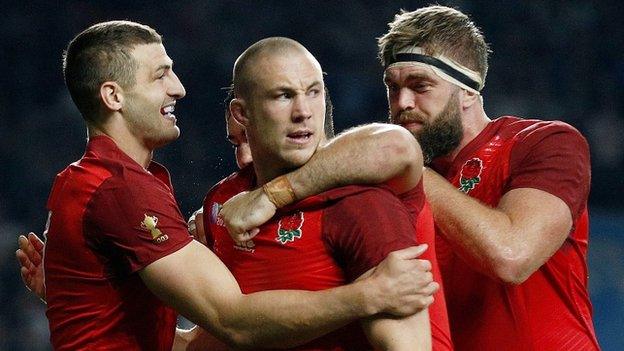Ben Ryan: Pacific Islands becoming rugby's 'Wild West', says ex-Fiji sevens coach
- Published
- comments
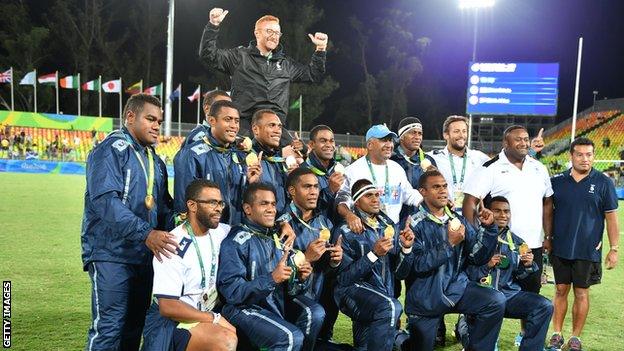
Ben Ryan, top, coached Fiji sevens to Olympic gold in Rio
Fiji, Samoa and Tonga are being stripped of their rugby talent by crooked agents and dodgy backhanders, says Olympic-winning coach Ben Ryan.
He says the lack of licensed agents has turned the Pacific Islands into the "Wild West" and claims players are being lured overseas on false promises.
He now wants significant changes to protect the smaller nations.
"Anyone can do anything, so it's the Wild West in that respect," the former Fiji sevens coach told BBC Scotland.
The Englishman also warned that:
Top clubs are actively harvesting Pacific Island "freaks" of increasingly young ages;
Impoverished islanders are lured overseas to provide for their families but end up representing other countries;
There are good agents but many are unregulated and unsupervised;
The game needs fresh ideas to create fair opportunities for the islanders.
What's going on?
In August, BBC Scotland detailed the anxieties of Shaun Longstaff, a former Scotland international and agent who scouts the Pacific Islands on behalf of some of Europe's elite clubs.
He claims he was told to find them "a freak". Not a playmaker, nor a goalkicker, they want the next hulking phenomenon and they want him cheap.
With players of athleticism, an intangible, un-coachable flair and a humble obsession with the game, the islands are a goldmine of box-office talent.
But without a professional league and given the Fijian national minimum wage - only introduced in 2014 - is just 87p per hour, players move abroad to earn for their families and fight for a Test jersey.
There are currently:
Nine Fijian-born or Fijian-capped players in England's Premiership;
Six in the Pro12, featuring teams from Ireland, Italy, Scotland and Wales;
Thirteen in the southern hemisphere's Super Rugby competition;
And 35 in France's Top 14.
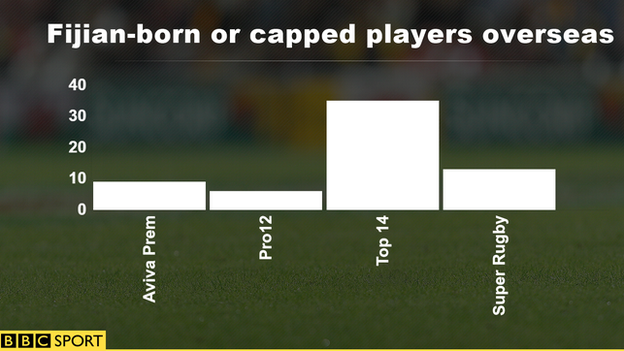
There are over 50 Fijian-born, or capped, players in rugby's top leagues across the world
Gaining a foothold in a top league overseas can mean players switching international allegiances.
"Unless you've got a full Test cap, you can't come into the Aviva Premiership," explains Ryan.
"It's a lot harder to come into the UK, so the French are poaching everyone."
He says the closest professional league to Fiji is the ITM Cup in New Zealand, but claims players from the Pacific Islands can only go there if they are qualified to represent the All Blacks.
"They get a Super Rugby contract dangled in front of them and they don't then come back across to play for Fiji," says Ryan. "Australia's the same."
How bad has it got?
A distinction should be made between islanders "poached" from overseas and those whose families emigrated while they were infants.
Many are products of diverse bloodlines and thus eligible for several nations, but more and more Fijians are choosing to play for their adopted homelands.
After serving a three-year residency period, Taqele Naiyaravoro and Henry Speight both played for Australia. Tevita Kuridrani also plays for the Wallabies after moving to Australia as a 16-year-old.
Elsewhere:
France have wingers Virimi Vakatawa and Noa Nakaitaci;
Waisake Naholo, who moved to New Zealand aged 17, is a regular on the wing for the All Blacks;
And number eight Nathan Hughes has chosen to play for England.
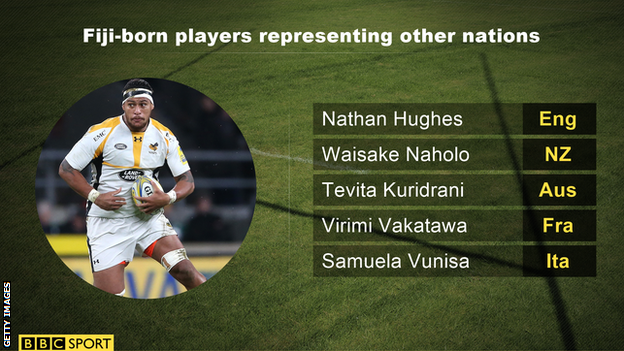
Many Fijian-born players, like Wasps' Nathan Hughes, have chosen to represent other nations at Test level, after completing three years of residency
"In 10 years' time, if things don't change, I see an Australian side with half their team coming from the islands, at least," says Ryan.
"I've heard of at least another dozen coming through the Australia ranks.
"There will be four or five others in France without doubt, because I know there are young kids there who are phenomenally talented and a year off getting residency, so it's inevitable unless we make something happen quickly."
In May, World Rugby's vice-president, Argentinian former scrum-half Agustin Pichot, spoke, external of his distaste for the present eligibility criteria.
But Ryan fears extending the residential period to five years, as has been mooted, would only drive scouts and clubs to recruit ever-younger players.
"I went to Toulon in pre-season and they knew about 15-year-olds that were playing in Fiji school competitions," he says.
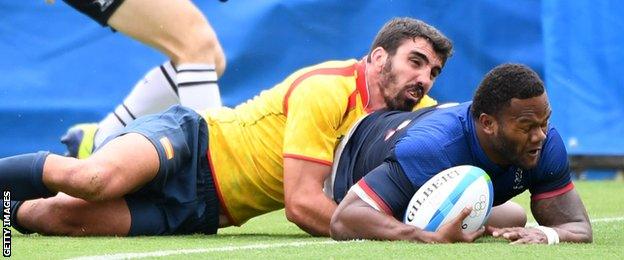
Fijian-born Virimi Vakatawa represents France in sevens and Tests
"They'll go to the villages, they'll give some money or incentives to their family to get them to go overseas. Then they'll take them to their French, Australian or New Zealand clubs or schools or academies.
"Some guys will make it, some guys won't. It's an educated gamble that more often than not pays off."
So what's the answer?
There is no regulation of agents and no compulsory registration. Ryan worries honest souls, like Longstaff, are outnumbered by those eager to plunder.
"There are dodgy agents and people on the islands cutting deals and taking backhanders," says Ryan, claiming players are often contacted via Facebook.
"There are some terrible agents, mainly the ones that have been kicked out of Australia and New Zealand.
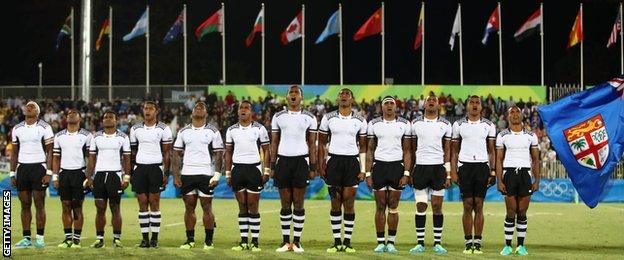
Ryan says his sevens players have "good, respected agents"
"They end up trying to get islanders across, saying how they helped them. It's the opposite. I've had players left high and dry.
"Where there is un-regulation, you're going to get cowboys out there that don't care and are just looking to make a quick buck."
Ryan, who quit as Fiji sevens head coach after the Rio Games, also wants more tangible assistance from those who hold the power in international rugby.
England's last Test in Fiji was in 1991 and they have never played in Samoa or Tonga. Neither have South Africa nor Australia, who haven't been to Fiji since 1984.
New Zealand have played recent internationals in the USA and Samoa, while two of their franchises, the Chiefs and Crusaders, played a Super Rugby fixture in the Fijian capital, Suva, in July.
However, the All Blacks themselves have never set foot in Fiji.
Meanwhile, Wales haven't toured the Pacific since 1994, France since 1998 and Ireland 2003. Of the Tier One nations, only Italy and Scotland have played Tests on the islands in the past five years.
Ryan says Fiji's recent success at the Olympic Games in Rio represents a good opportunity to take positive action.
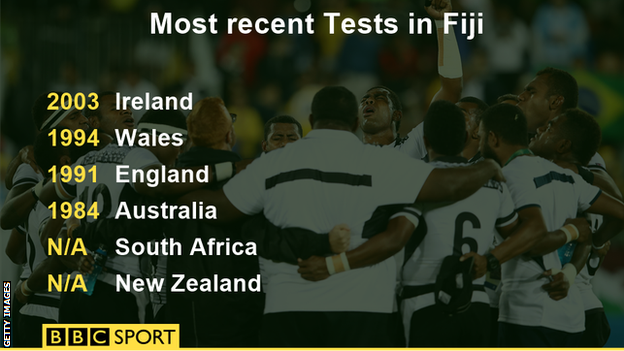
None of World Rugby's top-six ranked teams have played in Fiji since 2003
"For the greater good of the game, you need a bigger top table," he says.
"You need these teams trying to fight it out for quarter-final places at the World Cup - and that's not happening."
What else can be done?
Aside from losing players to richer nations, having so many internationals abroad makes preparing for Test matches extremely difficult.
Of last year's 31-man Fiji World Cup squad, 28 played club rugby overseas.
There are, stresses Ryan, diligent and savvy World Rugby operators on the islands striving to provide better governance and sharper infrastructure, but with limited success.
Ryan says a World Rugby-backed Pacific draft would help protect both players and countries.
He also advocates a percentage of a player's wages going back to their home union to "drive high performance" on the islands.
"If we have domestically contracted players that are earning good money and if all the boys were earning the same money they earn overseas, none of them would leave," he says.
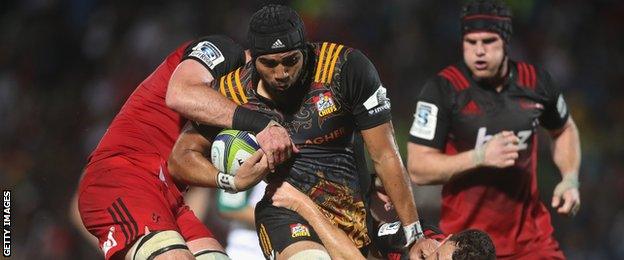
The Chiefs and Crusaders played a Super Rugby match in Suva, the Fijian capital, during July
Ryan says having a Fijian national team in Super Rugby competition would be "a game-changer", too.
He also suggests franchising the Fijian, Samoan and Tongan national teams would boost their earning potential by attracting all sorts of sponsorship.
Until then, he says, the Pacific Island teams - especially the 15-a-side teams - are going to suffer because they get very little contact with their players, "90% of whom are based overseas".
- Published12 August 2016
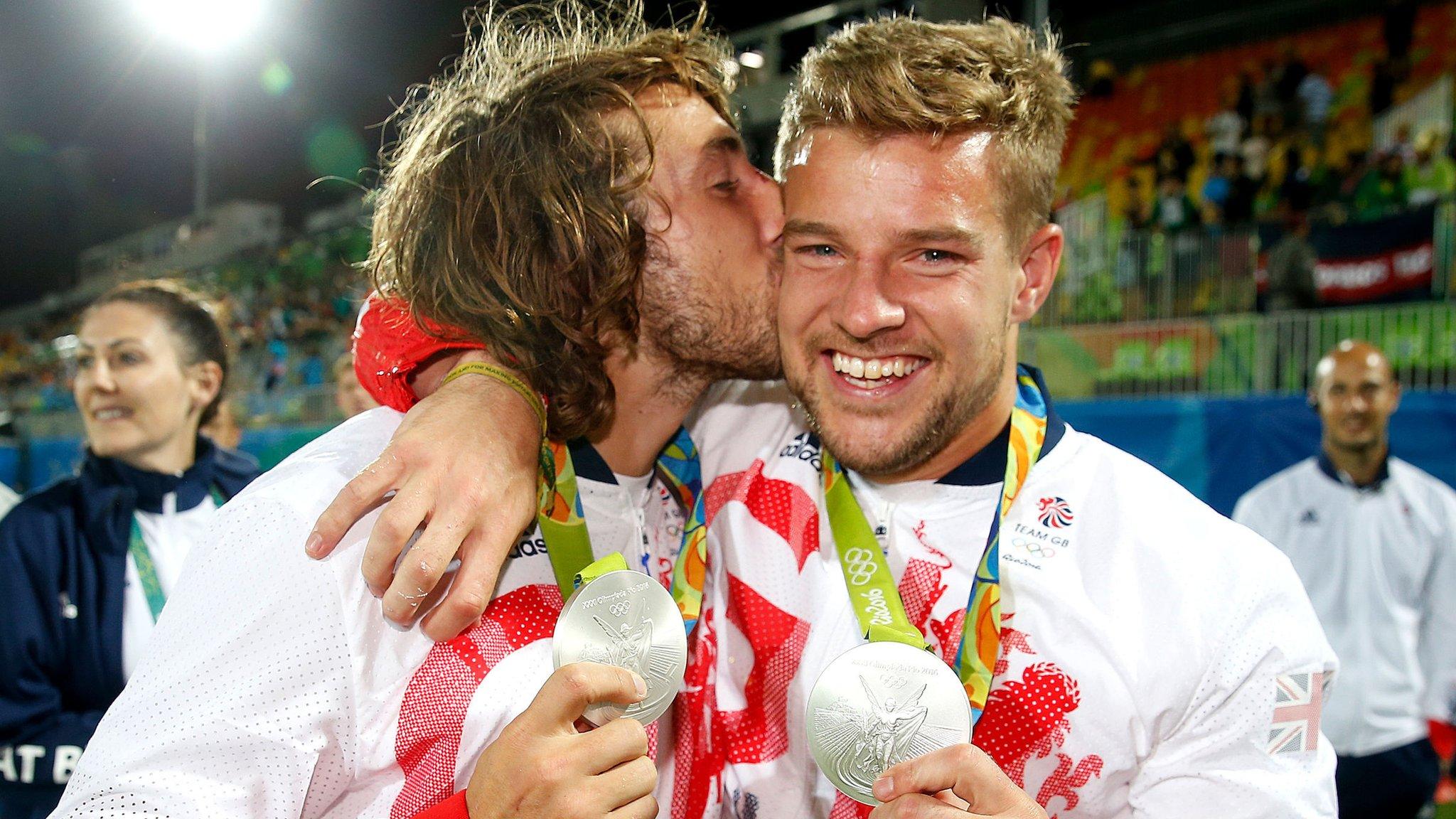
- Published29 August 2016
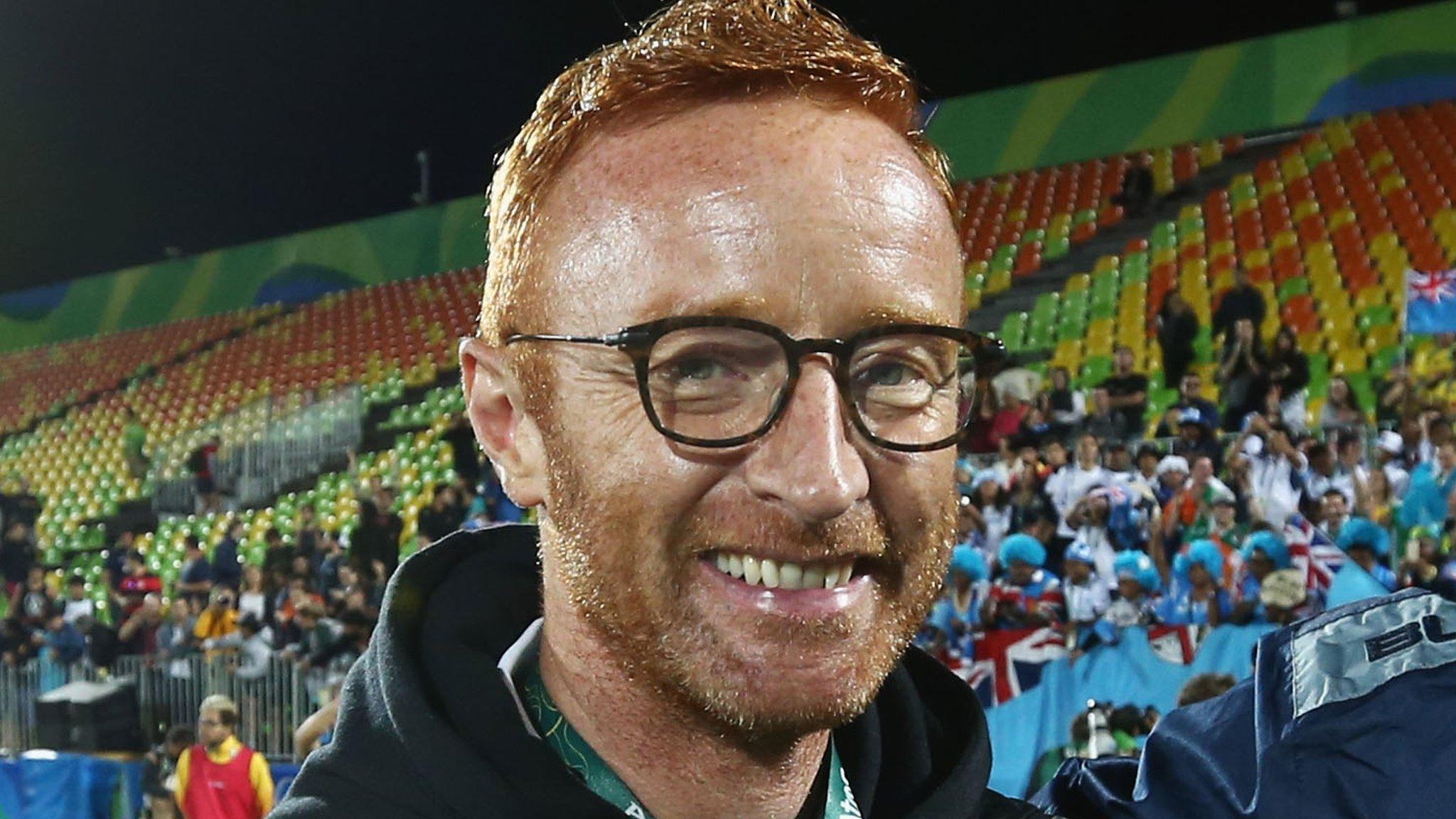
- Published5 September 2016
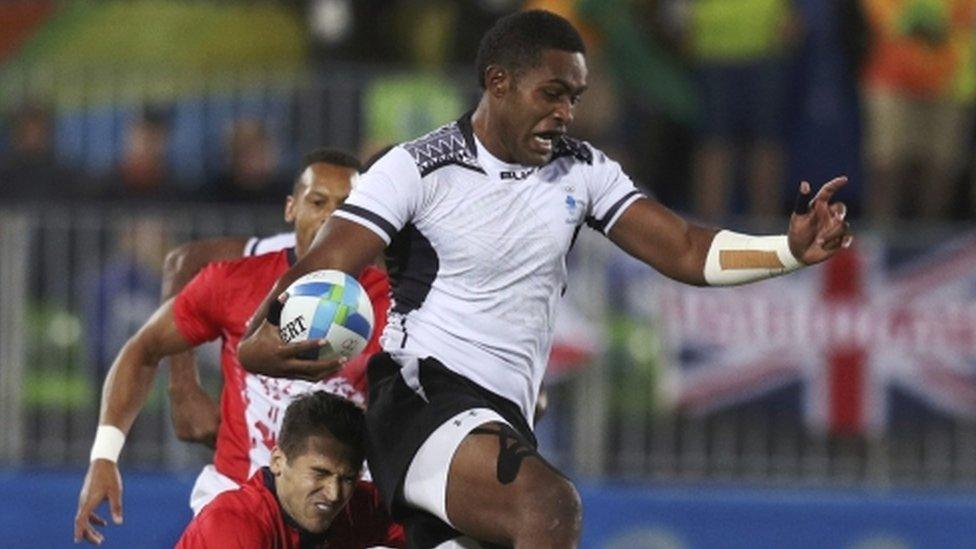
- Attribution
- Published12 August 2016
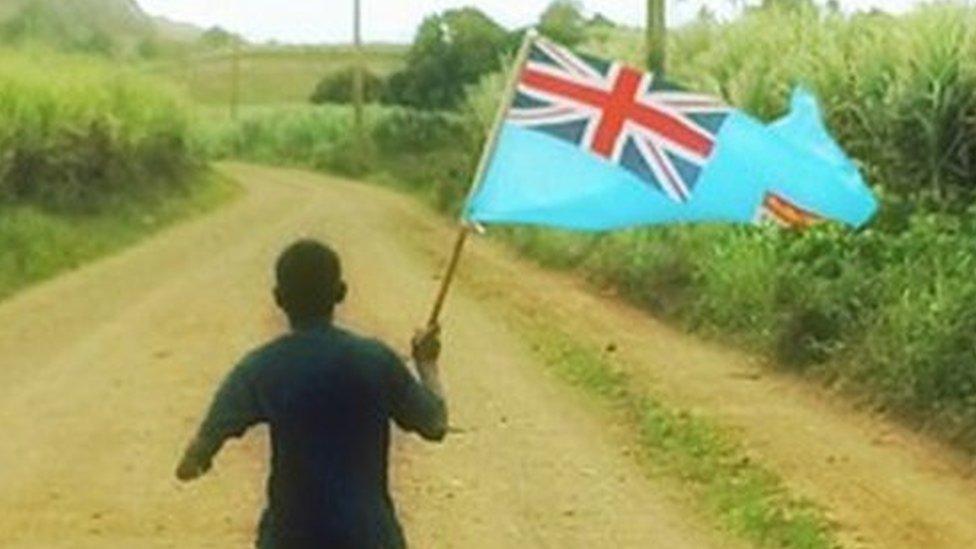
- Published18 September 2015
